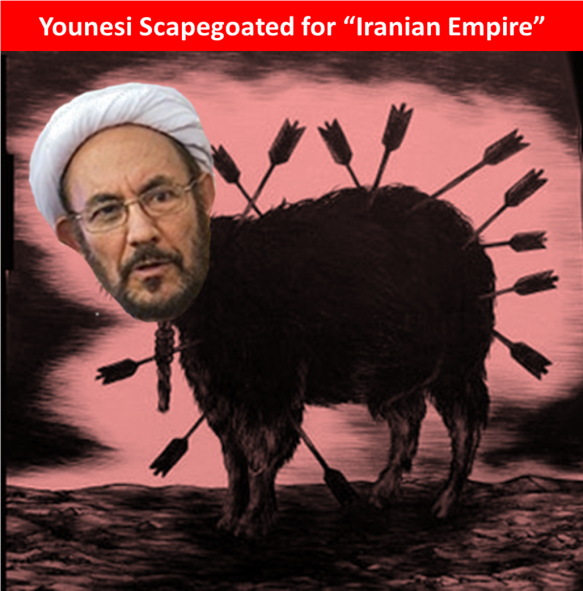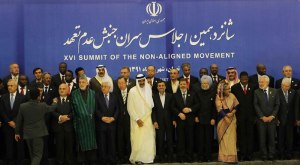 In these last few days, Iranians celebrated Nowruz (New Year) and President Obama released a video dedicated to all the “Iranian leaders and Iranian people”. In the message, Obama sounds optimistic, and explains to the people of Iran that this is a time to have “hope” for a better future after a nuclear deal is clinched. Four days later, Iran’s supreme leader Khamenei, responded to that message, with vitriolic rhetoric about how the US was not to be trusted and, “Death to America, of course”.
In these last few days, Iranians celebrated Nowruz (New Year) and President Obama released a video dedicated to all the “Iranian leaders and Iranian people”. In the message, Obama sounds optimistic, and explains to the people of Iran that this is a time to have “hope” for a better future after a nuclear deal is clinched. Four days later, Iran’s supreme leader Khamenei, responded to that message, with vitriolic rhetoric about how the US was not to be trusted and, “Death to America, of course”.
This is the part where I urge you, the reader, to watch both videos – both just over 4 minutes long. The overwhelming differences between them, once you watch, will make this post redundant.
A Different Perspective
 Obama and Khamenei are as different as the US and Iran: In less than 2 years, Obama, whose mandate of control was given to him by the voters in America, will step down from his office and be replaced by someone else. Khamenei, who was appointed by the Assembly of Experts for an indefinite term, will probably be replaced after his demise.
Obama and Khamenei are as different as the US and Iran: In less than 2 years, Obama, whose mandate of control was given to him by the voters in America, will step down from his office and be replaced by someone else. Khamenei, who was appointed by the Assembly of Experts for an indefinite term, will probably be replaced after his demise.
Obama wants a deal so bad, he is ready to fight congress for it, fight against his main ally in the Middle East (Israel) and veto any new sanctions. Sure, that doesn’t mean that he will sign a deal “no matter what”, but it is obvious to all that he is trying.
Khamenei is at best partial about the deal: During the last year, he changed his mind on the nuclear talks – in November he said that the lack of a deal shows Iranian strength, 3 months after that he claimed that no deal is better than a bad one, and in March he warned the US from spoiling the nuclear deal.
So while the Obama is busy trying to make a change in his limited time in office, Khamenei seems to be doing everything in his power to limit change.
“Death to America, of course”
 It’s chilling to see that not only does Khamenei’s crowd automatically go into “Death to America” chants, but that Khamenei, whose President and Foreign Minister are working hard to close a deal with the US, simply adds ” Death to America, of course”. “Of course”? Is calling for the death of a state and its people so trivial that he answers “of course”?
It’s chilling to see that not only does Khamenei’s crowd automatically go into “Death to America” chants, but that Khamenei, whose President and Foreign Minister are working hard to close a deal with the US, simply adds ” Death to America, of course”. “Of course”? Is calling for the death of a state and its people so trivial that he answers “of course”?
What is his message to the Americans and to the Iranians who look on in hope that a peaceful solution be attained? It certainly isn’t one of rapprochement and of change – it is simply reverting to the dogmatic cries that have kept Iran isolated and under sanctions for so long.
As we outlined in an earlier post, the nuclear deal is not really about centrifuges and degrees of Uranium enrichment: it is about the state of mind and the goals of Iran’s leaders. If you think that the call of “Death to America” sounds horrifying now, imagine hearing the same chant knowing that Iran has a nuclear bomb.
If Khamenei hates the Americans so much and he keeps on changing his mind, they why is he allowing his government to conduct negotiations? In short: regime survival, “Money”.
Khamenei’s power as a Supreme Leader is severely tested in times of economic hardships. These economic hardships are a result from his policies. If the Iranians get too hungry, they might hit the streets in an effort to change his policies or change him. The ONLY reason Khamenei is willing to negotiate a deal is to immediately relieve Iran of the crippling sanctions while keeping the nuclear program intact. What happens after that is irrelevant to him since he will be dead.































